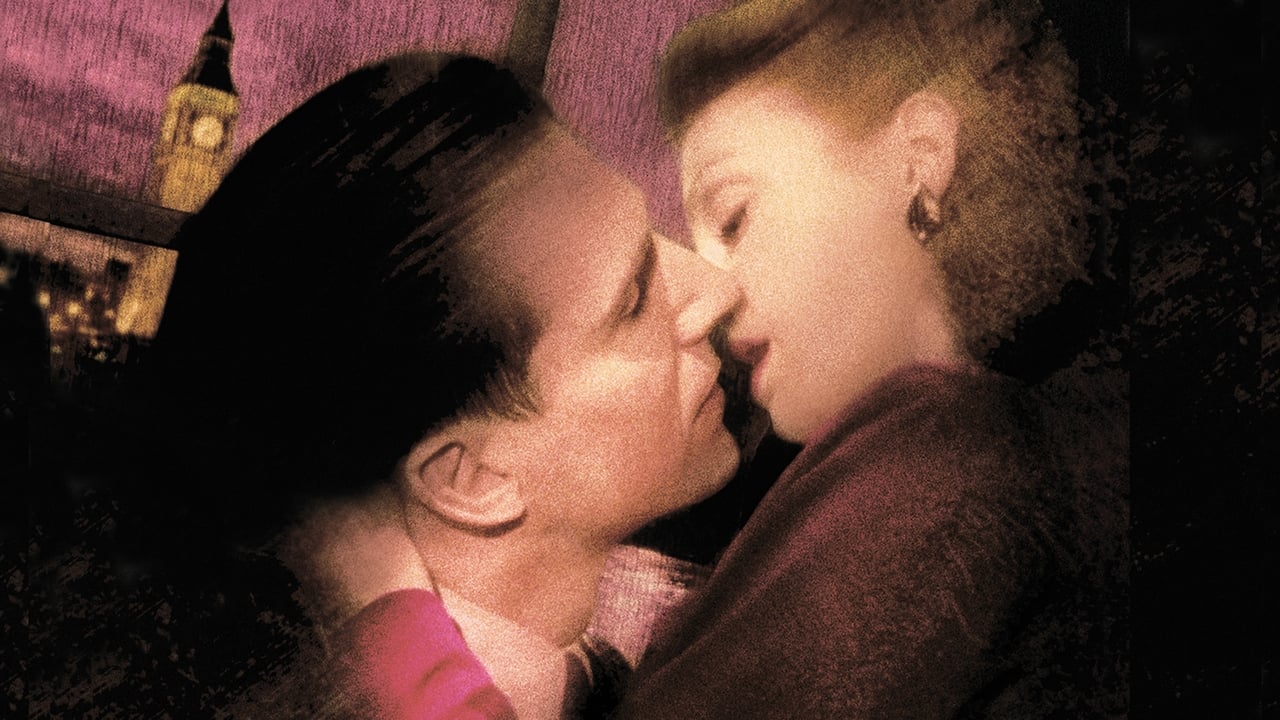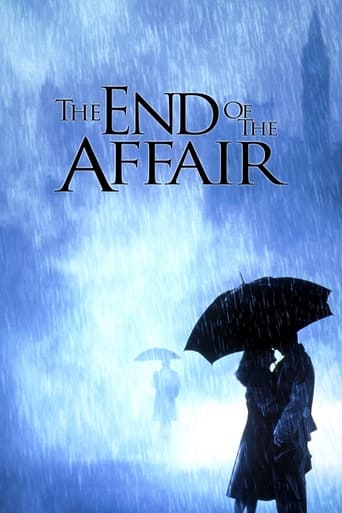

Save your money for something good and enjoyable
... View MoreVery interesting film. Was caught on the premise when seeing the trailer but unsure as to what the outcome would be for the showing. As it turns out, it was a very good film.
... View MoreIt's entirely possible that sending the audience out feeling lousy was intentional
... View Moreif their story seems completely bonkers, almost like a feverish work of fiction, you ain't heard nothing yet.
... View More"I'm bored with my husband." "I'm bored with my life." "Let's have sex like teenagers." "Sweet."Welcome to "true love," _End of the Affair_ style. No indication of how the lead characters came to actually "love" each other, or what that "love" consisted of besides sex or creepy obsessive jealousy.The "twist" when it comes is underwhelming, to say the least, and involves retreading material that was dull the first time, and depends on the trite inability of the estranged hormone-weasels to actually TALK to each other. That's true love right there, folks.But hey, being a creepy obsessive stalker pays off, which is {sarcasm}an awesome moral to impart{/sarcasm}. Or rather, it would pay off for more than a brief interlude if it weren't for the glaringly obvious Chekov's gun being fired. The predictable denouement that follows rambles rather interminably, right to a saccharine beatification and cheap attempt at a metaphysical love/hate relationship with God. Meaningful, see?This movie wants to be a self-indulgent tragedy, but it's just tragic.
... View MoreThere are plenty of interesting, excellent and introspective cinematic explorations out there. This is *not* one of those movies. Neil Jordan' self-absorbed direction propels the plot into high melodrama, assisted by a score marred by unrelentingly saccharine strings and banal chords. The characters' inner conflicts are so straightforward it becomes ridiculous to watch them wallow in fake turmoil. I couldn't begin to start caring about their pathetic predicaments. Despite all this, the actors' performances are authentic and the love scenes are steamy, but nothing can save this film from being absurd, empty, nauseating drivel. I usually trust Finnes' and Moore's taste in scripts. Lesson learned. I assume the competition was thin on the ground the year this film won a BAFTA and an Oscar nomination.
... View MoreThere are faces that cameras like. Ralph Fiennes, for example, in any movie you watch him, whether he is a psycho killer ("Red Dragon") or Voldemort himself ("Harry Potter"), he looks good. If the camera loves you, you don't need to worry because at the end of the day everything will be okay, and I say this because I've never thought of him as a great actor. Again, the camera loves his face but that face says nothing to me. Even more interesting, I've never seen him hit the right chemistry with a female co-star; not with Jennifer Lopez in "Maid in Manhattan", not with Rachel Weisz in "The Constant Gardener". Here, in Neil Jordan's "The end of the affair", the chemistry is not the best with Julianne Moore, but we feel the overwhelming love the movie is trying to express. Has it got to do with other things? Julianne Moore, undoubtedly one of America's best contemporary actresses and one that can do just about anything, plays Sarah Miles, the wife of Henry Miles (Stephen Rea) who falls in love with Maurice Bendrix, the character played by Fiennes.This is the basic establishment of the film, which will revolve around these three characters in what we could define as an 'exploration'. Jordan, who adapted Graham Greene's homonymous novel in a very ambitious script, is great at playing with expectations. The viewer never quite knows when things are occurring and if they are truly occurring: characters wear the same clothes most of the time, scenes and conversations are repeated from different perspectives and flashbacks come out of nowhere. From the very first scene, Roger Pratt's cinematography suggests quite a dreamlike mood; and Michael Nyman's intense score accentuates it. So Jordan develops the characters, makes them talk, shoots them making passionate love in sex scenes that say a lot, works heavily on the looks and everything turns slow, very slow so we can understand this 'affair'; but nothing is ever boring. To contribute to the definition of 'exploration', the film introduces a private investigator as a major secondary character (played by Ian Hart) as both Sarah's husband and her lover in different occasions attempt to investigate her. Turns out Sarah is a woman with a very profound inner world, that translates differently on the outside.This ambivalence is the key of Moore's brilliant performance, and in a film with very few of those we would call moments, she composes a human being we want to understand and we finally do because Moore and the movie gladly help us. There is one scene, maybe the film's only 'moment', in which a siren sounds and Sarah has to leave Maurice. Pay attention at Moore in that precise moment, at everything she does and says before concluding in one simple word: "Yes". What she does can't be described because it must be experienced; and that whole scene in which Fiennes shines like man filled with love, is a scene I'd like to be able to watch frequently as it occurs to me with scenes in movies that represent pure, perfect acting (I recall one scene with Winona Ryder and Cher in "Mermaids" do you remember?).The portrayal of Stephen Rea as Sarah's husband Henry is also crucial, because his character needs to appear as completely naive and insubstantial, and it's not easy to sustain that image for two hours. Rea really seems like an anonymous guy in the world. Fiennes' work on the other hand expresses the monumental love I was just talking about. His character is a writer, and as Sarah's lover, he finds a new meaning for love every day, and astonishes her with how he puts it in words. Henry and Maurice are two jealous men, of the same woman; and it will be the writer who will at one point tell Henry: "Lovers are jealous, husbands are ridiculous", resuming in this way their fundamental difference. I still haven't talked about God; about another part of the definition of 'exploration' that is related with exploring the faith. It is not a minor subject of the movie and it's implicated in some of the things I've said in this review, but I'll leave it for you to discover that plot line and relate it with the things I admired about this very ambitious piece. A piece you could see as a story about an affair, as a tale about love, as a character piece, or more concretely expressed and interesting: the story of two men united by the love they felt for the same woman. Would you go see a film promoted like that? Everything is possible.
... View MoreThe End of the Affair is one of those old fashioned romantic type British films along the lines of Brief Encounter. Julianne Moore got an Oscar nomination for Best Actress, but no one in that year was going to beat out Hillary Swank.Ralph Fiennes has a chance meeting with Julianne Moore and her husband Stephen Rea and the passion gets going almost immediately. The apparently indifferent Rea almost makes the affair too easy for both Fiennes and Moore. Eventually though she breaks it off abruptly with Fiennes and he's obsessed to find out why.He hires a private detective played by Ian Hart and his report leads to some surprising developments for all concerned.The film is based on a Graham Greene novel though you can bet that the very Catholic Mr. Greene would not have approved of what Fiennes tells to a Catholic priest played by Jason Isaacs.Actually I liked the rather droll performance of Ian Hart as the detective who winds up working for two of three sides of the triangle and has no scruples about getting his 10 year old son involved to achieve results. Hart did very good work also in Backbeat, playing a young John Lennon.This is a remake of a 1955 film that starred Van Johnson and Deborah Kerr though you can bet it was not as graphic as this version is.For those who love old fashioned romances, you'll like The End of the Affair.
... View More